SEO search intent, also known as keyword intent, refers to the purpose or reason behind a user’s query on a search engine. When a person types something into Google, they are looking for a specific answer, service, or piece of information. Search engines strive to provide the most relevant results by understanding this intent.
It goes beyond just identifying the words used in the query; it dives into the why behind the search. Understanding search intent allows businesses to create more tailored content, improving both the user experience and SEO performance.
The Importance of Search Intent in SEO
Search engines have evolved. Google’s algorithms are designed to not just look at keywords but to also understand the user’s intent behind those keywords. This shift from keyword-focused SEO to intent-focused SEO has transformed how businesses should approach their content strategies.
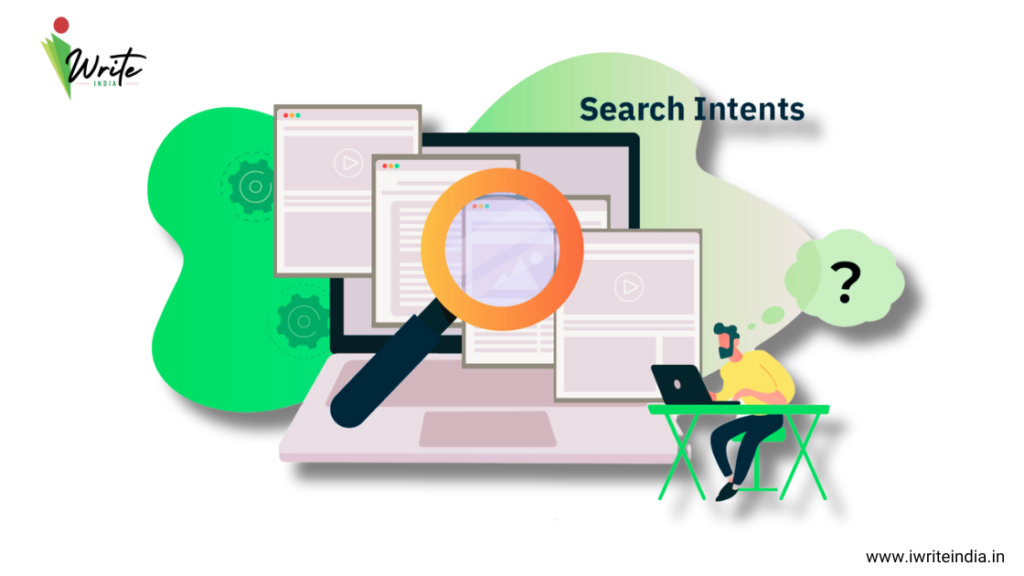
If you fail to align your content with search queries, you risk missing out on potential customers because your content will not match what searchers are looking for. According to a 2023 study by HubSpot, 76% of marketers found that optimising for user intent boosted their organic search rankings more than focusing solely on keywords.
Types of Search Intent
There are four primary types of search intent:
| Search query Intent Type | Description | Example Query | Recommended Content Strategy |
| Informational Intent | The user is looking for information, education, or an answer to a specific question. | “What is SEO user intent?” | Create in-depth blog posts, guides, tutorials, or FAQs that answer common user questions. |
| Navigational Intent | The user is searching for a specific website, brand, or page. | “Facebook login page” | Optimise landing pages for brand or product name searches. Ensure easy navigation and SEO tags. |
| Transactional Intent | The user is ready to make a purchase or complete a specific action, like signing up or downloading. | “Buy iPhone 16 online” | Focus on product pages, clear CTAs, pricing, and reviews. Implement e-commerce best practices. |
| Commercial Investigation | The user is comparing products or services before making a purchase decision. | “Best digital marketing agency in Delhi” | Create comparison guides, case studies, reviews, and service/product feature breakdowns. |
Understanding these types of intent helps businesses create content that resonates with users and meets their needs at every stage of the buyer journey.
How to Identify User Intent for Keywords
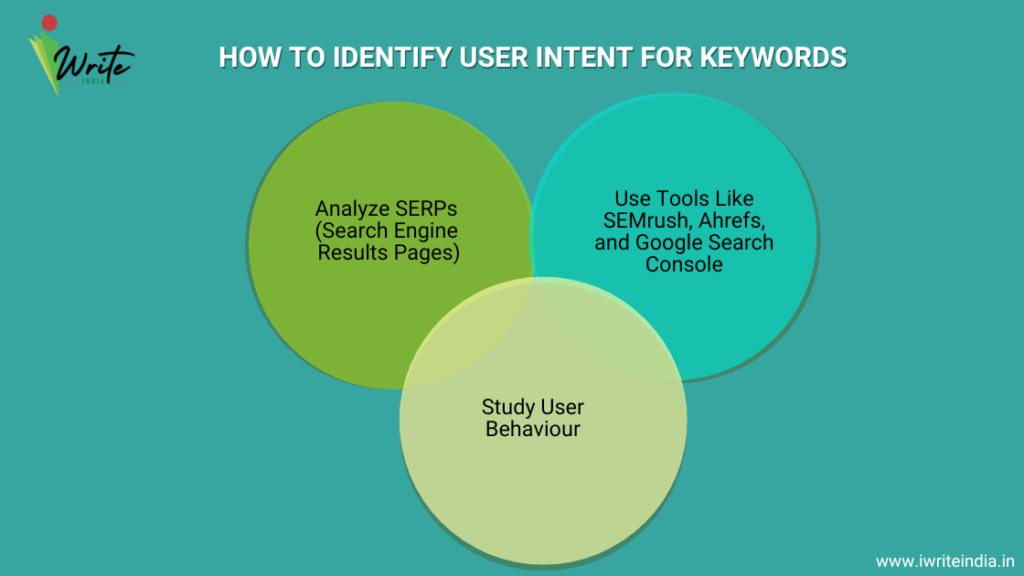
Identifying search query intent is more than just choosing high-traffic keywords. Here’s a step-by-step process to help you identify the intent behind keywords:
- Analyse SERPs (Search Engine Results Pages): Look at the top results for your target keywords. Do they consist of informational blogs, product pages, or reviews? This gives you a hint about the intent.
- Use Tools: Tools like SEMrush, Ahrefs, and Google Search Console can help analyse keyword intent by showing which pages are ranking and what type of content is performing well.
- Study User Behaviour: Pay attention to user engagement metrics, such as bounce rate and time on page, to assess whether your content aligns with the user’s intent.
Optimising Content Based on Search Intent
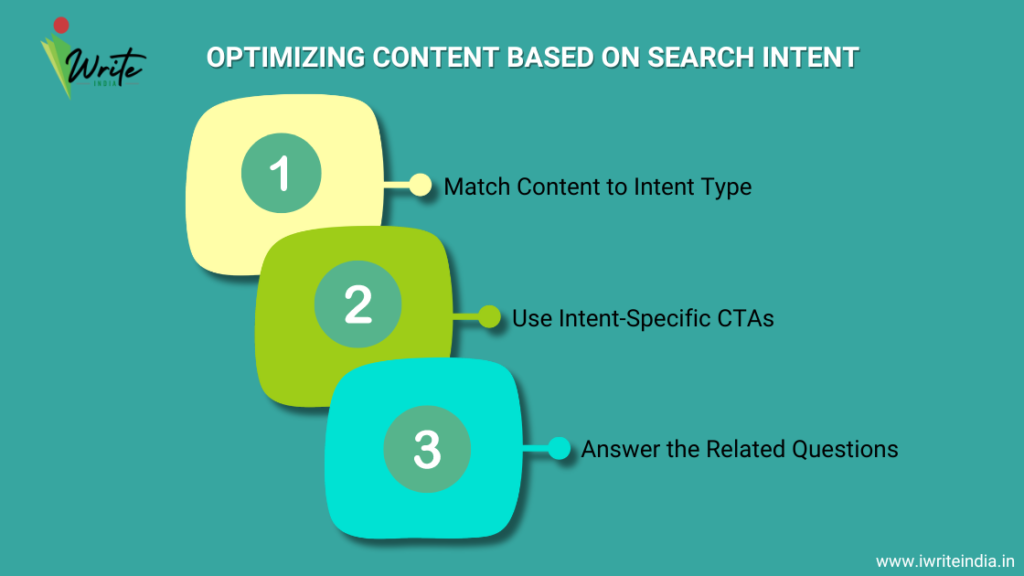
To optimise content for search queries, follow these strategies:
- Match Content to Intent Type: If the keyword suggests informational intent, create detailed guides or how-to articles. For transactional intent, optimise product or service pages.
- Use Intent-Specific CTAs: Tailor your call-to-actions based on the user’s intent. For example, an informational blog can offer a free guide, while a product page can have a “Buy Now” button.
- Answer the Related Questions: Include answers to related questions or FAQs that align with the intent. This not only improves SEO but also positions you as an authority in the field.
How User Intent Impacts Digital Marketing Agencies
For businesses like a digital marketing agency in Delhi, understanding and optimizing for search query is critical. Agencies need to ensure that their content meets the specific needs of potential clients, whether they are researching services, looking for case studies, or ready to hire.
For instance, if someone searches “best digital marketing agency in Delhi,” they likely have commercial intent. Therefore, agencies must optimise their service pages, add client testimonials, and ensure seamless navigation to capture and convert leads effectively.
Best Practices for Aligning Content with Search Intent
- Use Data-Driven Content: Research keyword intent through analytics tools and base your content strategy on user behavior.
- Optimise for Featured Snippets: Create content in a question-answer format that can potentially rank in Google’s featured snippets.
- Focus on User Experience: Ensure that your content is easy to navigate, quick to load, and mobile-friendly, as these are crucial factors for SEO success.
The Role of Keyword Intent in Search Intent Optimization
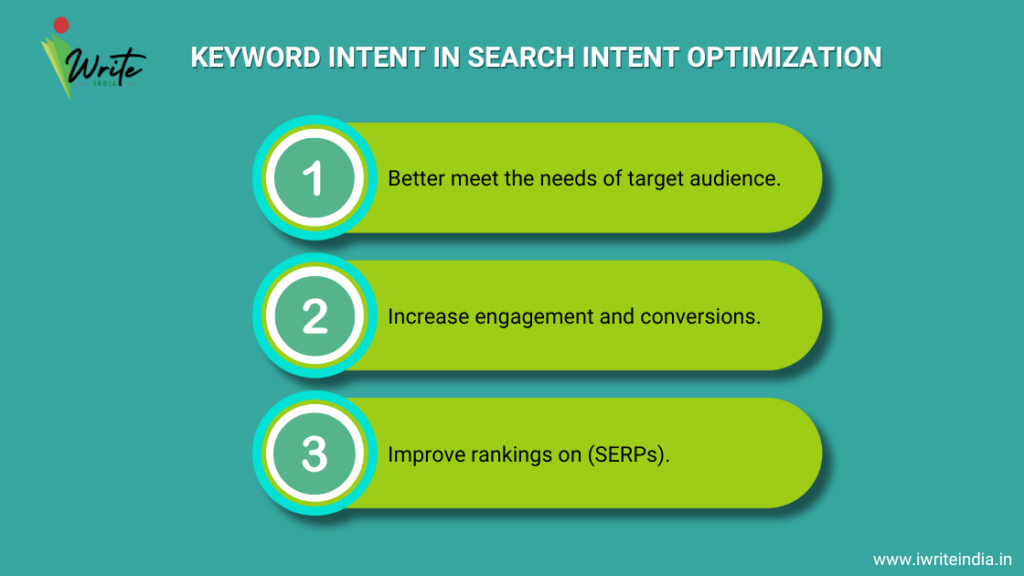
Keyword intent plays a pivotal role in user intent optimisation. By understanding the specific intent behind each keyword, businesses can:
- Better meet the needs of their target audience.
- Increase engagement and conversions.
- Improve their rankings on search engine result pages (SERPs).
For example, if a user searches for “affordable digital marketing agency in Delhi,” the keyword intent suggests the user is in the decision-making stage. Optimising content with this keyword will improve visibility for users ready to engage with your business.
How an SEO Agency in Delhi Leveraged Search Query
A leading SEO agency in Delhi worked with a client in the healthcare sector to improve their SEO rankings. By analysing the search queries behind the client’s target keywords, they created content that addressed the informational needs of users at the top of the funnel and transactional content for users ready to book appointments.
The result? A 35% increase in organic traffic within six months and a 22% increase in lead generation.
Why User Intent is the Future of SEO
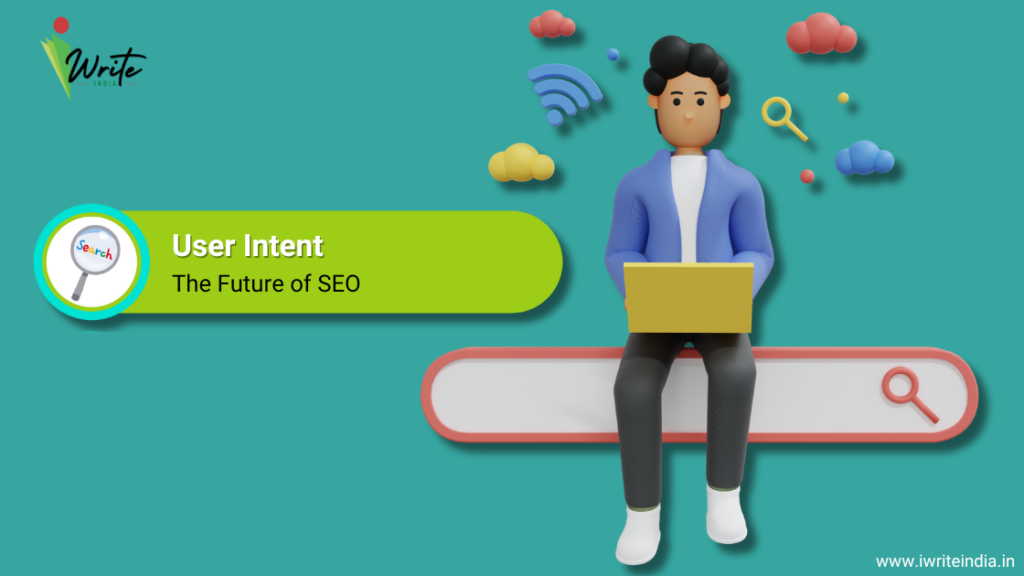
In the rapidly evolving world of SEO, understanding and optimising for user intent is no longer optional—it’s essential. By aligning your content strategy with user intent, you not only enhance your search rankings but also build a stronger connection with your audience. Businesses that prioritise user intent in their digital strategies are better equipped to meet user expectations and achieve higher conversions.
Boost Your SEO with iWrite India
Ready to improve your SEO by aligning with search queries? iWrite India, a top SEO agency in Delhi, specialises in crafting SEO strategies that focus on understanding and optimising for search query intent. Contact us today to take your digital presence to the next level with personalised, data-driven solutions.
FAQs about SEO Search Intent?
- What are search queries in SEO?
Search intent refers to the underlying purpose or reason behind a user’s search query. It is categorised into informational, navigational, transactional, and commercial intent. - Why are search queries important for SEO?
Search engines prioritise content that aligns with the user’s intent. By understanding the search query, you can create more relevant content that ranks higher and effectively engages your audience. - How can I determine the user intent of a keyword?
You can determine user intent by analysing the SERP results for a keyword, using SEO tools like Ahrefs, and assessing user behavior metrics on your website. - How does keyword intent differ from search query intent?
Keyword intent refers to the intention behind a keyword, while search query intent is the broader concept that includes understanding the user’s overall goal when searching. - What role does user intent play in content creation?
User intent helps guide content creation by ensuring your content addresses what users are looking for, thus improving engagement and increasing the likelihood of conversions.




